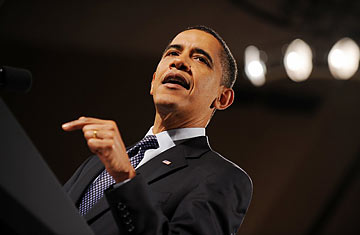
President Barack Obama
(2 of 2)
Israel and the Palestinians: On his first day in office, Obama announced that he would prioritize an "aggressive" push for a two-state peace between Israel and the Palestinians. To jump-start talks, Obama demanded that Israel halt all settlement construction on territory conquered in 1967 and pressed Arab states for more gestures toward normalizing ties with Israel. He had no luck on either front. Indeed, the gulf between Israel's right-wing government and the enfeebled Palestinian leadership of President Mahmoud Abbas is growing ever wider. Abbas has been eclipsed by the more radical Hamas movement, and his failure to deliver significant gains for his years of negotiating with Israel and the U.S. has left his popularity at an all-time low. The Obama Administration has maintained its predecessor's boycott of Hamas and has declined to intervene meaningfully in the standoff in Gaza, where Israel maintains an economic stranglehold aimed at toppling Hamas. So despite his best intentions, Obama closed out 2009 in a situation not unlike that of Bush's valedictory year — pressing for talks between Israel and an increasingly marginal Abbas while wishing away the problem of Hamas. After a year of peacemaking, the Administration is more likely to confront a resumption of hostilities in Gaza (and possibly the West Bank) than it is to see any diplomatic breakthrough.
Russia: The Obama Administration promised to hit the reset button in relations with Moscow, hoping that by addressing Russian concerns on the stationing of U.S. missile defense assets in Eastern Europe it could coax Russia on board with U.S. efforts to pressure Iran. But while the Administration berates the Russians for being locked into a Cold War mind-set, the Russians say the same about the U.S. policy of maintaining the NATO alliance (constructed especially to contain the Soviet Union) and extending it to Russia's borders by seeking to draw in the likes of Georgia and Ukraine. Those policies originated with the Clinton Administration rather than with Bush, and they have locked Moscow into a strategic competition with Washington — talk of a reset button is unlikely to change that. Sure, Obama is negotiating new arms-control treaties with Moscow, but that's vintage Cold War. Even then, Russia is playing hardball and looks set to continue making its decisions based on a strategic rivalry with the U.S.
North Korea: Bush initially tried to reverse the Clinton Administration's policy of multilateral talks offering North Korea incentives for refraining from building nuclear weapons. The North couldn't be trusted to keep its word, Bush said, and he wasn't necessarily wrong. But he soon discovered that he had no alternative but to continue the approach of multilateral diplomacy through the six-party talks to coax North Korea into relinquishing its nukes. And that policy remained despite repeated North Korean nuclear and missile tests. Nobody expected anything different from the Obama Administration, and Obama, to his credit, didn't bother to create the illusion that there were any good alternatives.
China: Any hawkish ideas that the Bush Administration may have harbored about aggressively "containing" China went down with the U.S. spy plane that collided with a Chinese fighter off Hainan Island barely two months into the Bush presidency. The resulting standoff reminded both sides that their economic relationship was far too important to allow a little geopolitical competition to get in the way, and that same economic relationship — with an ascendant China now bankrolling much of a trillion-dollar U.S. budget deficit — continues to shape the relationship under Obama. Sure, Obama's realpolitik has seen him refrain from some of the largely symbolic irritants to the U.S.-China relationship that Bush was willing to risk, such as meeting with the Dalai Lama or going to church in Beijing to express solidarity with Chinese Christians, but then, Obama's America is even more financially dependent on China's goodwill than Bush's was.
Al-Qaeda: The attempted Christmas Day terrorist attack on an airliner landing in Detroit was a reminder that al-Qaeda is still with us — albeit in radically depleted form. While the war launched in Afghanistan in response to its first attack on U.S. soil remains a tough challenge, the terrorist network has been left on the defensive by years of intelligence and police work that have systematically rolled up or killed many of its key leaders. (Unfortunately, the wars in Afghanistan and Iraq have provided plenty of willing recruits for what remains of the organization.) Obama has tried to transform relations between the U.S. and the Muslim world through a dialogue outreach that he began with his Cairo speech last spring, but the realities of Iraq, Afghanistan and the Israeli-Palestinian conflict have hampered that effort. The fact that the Nigerian man accused of the Detroit bomb plot was allegedly trained in Yemen has raised questions about whether Obama should initiate a new "war on terror" front there. But it's a complicated country that many analysts warn would be antagonized by a high-profile U.S. presence — just as Western troops in Afghanistan have spawned the Taliban revival. How the new Administration handles the challenge of al-Qaeda in Yemen may be an important indicator of what it has learned from Bush's experience in Afghanistan.
